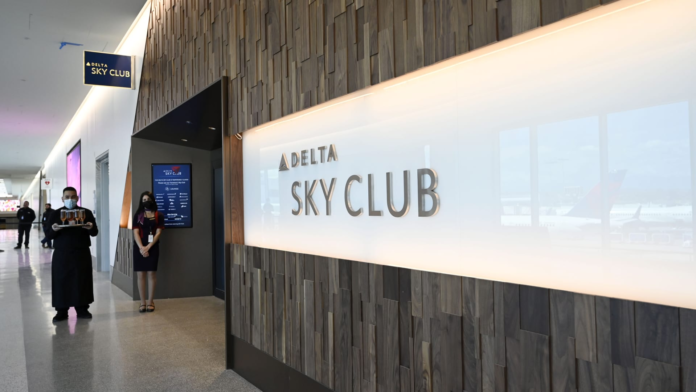The new Delta SkyClub at Los Angeles International Airport (LAX), Terminals 2 and 3 where the reimagined state-of-the-art facilities will soon welcome millions of guests each year. Media News Group | Long Beach Press-Telegram via Getty Images
When United Airlines gate agents call the first boarding group, Ted Cohen notices something he never saw in his decades crossing the globe as a music industry executive: crowds. The “preboarding” group includes members of United Global Services, an invitation-only status for top customers, and United Premier 1K, an upper-level tier in the airline’s Mileage Plus frequent flyer program. “It used to be two or three people, and you used to say, ‘Who is that?’ And now it’s a small army,” said Cohen, who leads a digital entertainment consulting firm and has lifetime elite status on United and American Airlines . Welcome to air travel’s era of mass luxury. Travelers willing to shell out more for tickets and popular rewards credit cards are swelling ranks in front cabins and airport lounges. Now airlines are trying to handle the surge of big spenders — without compromising the appeal of their lucrative loyalty programs and most expensive seats. This year, not everyone will make the cut. The largest U.S. carriers — Delta Air Lines , American and United — are raising spending requirements to earn some elite frequent flyer tiers that grant free upgrades, early boarding, discounted or complimentary lounge memberships and other perks. Executives say the richer requirements are the product of the pandemic. Airlines had extended frequent flyer status without requiring travelers to meet the usual annual thresholds because would-be passengers were sidelined. In the meantime, customers kept spending on their rewards credit cards, racking up points and perks along the way. “We feel like we’re royals even though we’re not rich at all,” said Damaris Osorio, a 27-year-old based in New York who runs a vintage clothing business. Osorio frequents airport lounges on trips booked with rewards points that she earned through strategic credit card use and sign-up bonuses. Last year she and her fiance traveled to Brazil, Chile, Argentina and Italy, all on flights she paid for with points. She said she cares little about sitting in the front of the plane, but has a preference for the American Express Centurion Lounges, which she gets into with one of her Amex cards. Osorio realizes she’s not alone. “You notice how much busier it’s getting at the lounges,” she said. “I go as early as possible to maximize what I’m taking away.” Next month, Amex Platinum cardholders will be charged $50 for each guest they bring to a Centurion Lounge. Those cardholders can currently bring in two guests for free.
‘If everyone is special, no one feels special’
For the airlines, hordes of high spenders are a good problem to have two years after the pandemic drove them into a $35 billion hole, despite billions in taxpayer aid. Airlines are profitable again, with travel roaring back and flyers who are willing to pay up for a little bit more space or privacy on their trip. Airlines’ lucrative credit card partnerships helped them stay afloat in the pandemic. They sell miles to credit card companies, and bringing in billions of dollars. Now they have a lot of travelers itching to cash in rewards.
If they call biz class boarding and it’s like the start of the Indy 500 … it’s not going to be a pleasant experience. Henry Harteveldt founder of Atmosphere Research Group
Delta said in an investor presentation last month that premium products and non-ticket revenue will make up 57% of its sales this year, up from 44% in 2014 and 53% in 2019, before the pandemic. That category includes revenue from top-end international business-class seats, extra-legroom seats and other sources, such as its partnership with American Express . After some customers complained about crowds and long lines at its Sky Club airport lounges, Delta said late last year that it will raise the prices and the requirements to gain access to those facilities. Earlier in 2022, it also instituted a three-hour time limit for lounge use and created a VIP line for high-status holders. CEO Ed Bastian said recent policy changes aim to address pandemic-era status extensions and the rise of customers spending more for travel. “We’ve got to address that in some way to be fair to everybody, because as they say, ‘If everyone’s special, no one feels special,'” Bastian said in an interview last month. “We’re trying to do it in a fair way.” United’s chief customer officer, Linda Jojo, put it similarly at a recent industry conference. “If everybody has status then nobody has status,” she said. In November, United said it was raising the requirements to earn status and perks. United also opened a new mini-lounge at its hub at Denver International Airport, catering to customers on the go who are flying on regional feeder jets, a move that could help free up space in larger facilities for travelers hanging out longer.
United Airlines Polaris lounge at Newark Liberty International Airport Leslie Josephs | CNBC
Last month, American Airlines said customers will have to spend or fly more to reach the lowest elite tier in its AAdvantage frequent flyer program. Customers will soon need 40,000 so-called loyalty points instead of 30,000 for Gold status.
Bigger space for big spenders
Delta, American, United and American Express have been opening bigger airport lounges to fit more travelers. American and its trans-Atlantic partner British Airways in November opened new, high-end lounges at John F. Kennedy International Airport with showers, bars and lots of workspace. The three lounges roughly double the square feet that American previously offered at JFK to about 65,000 square feet, an airline spokeswoman said. “There’s a tremendous demand for it, and we got to make sure that we are taking care of customers how they want to be taken care of,” American Airlines CEO Robert Isom said at the JFK lounge opening. Several full-service carriers have also moved away from long-haul first class cabins in favor of more premium economy seats — in between business-class and standard coach seats — and larger business-class cabins that fit scores of travelers, particularly on long flights. Many of the newer business-class seats are roomier and come with more amenities than first-class seats of the past.
A new American Airlines and British Airways lounge at John F. Kennedy International Airport, November 29, 2022. Leslie Josephs | CNBC
American Airlines is planning to get rid of a separate first class on some older planes used to fly longer routes in favor of a single, expanded, business class featuring new suites with doors. The airline said premium seats on its long-haul fleet will increase by more than 45% by 2026. But with the expansion of that cabin comes the risk of diluting the premium feel, said Henry Harteveldt, a former airline executive and founder of Atmosphere Research Group. “If they call biz class boarding and it’s like the start of the Indy 500 and you have 70 people jostling to get down the jet bridge, it’s not going to be a pleasant experience,” he said.
‘I don’t sit behind the wing’
Airline perks and elite status will be harder to earn this year
Recent Comments
on Army vs. Coastal Carolina live stream, how to watch online, CBS Sports Network channel finder, odds
on AL Rookie of the Year Julio Rodriguez Spreads Joy and Sportsmanship to the Youth of Loma de Cabrera
on After UFC Fallout, Conor McGregor Offers a Valuable Piece of Advice to Free Agent Francis Ngannou
on Dubai International Airport sees 41.6 million passengers in first half of year, more than in 2019
on Devout athletes find strength in their faith. But practicing it and elite sports can pose hurdles
on Despite strong Lunar New Year holiday data, consumer spending in China isn’t roaring back just yet
on Dave Portnoy: Taylor Swift’s security should ‘drag Kim Kardashian to jail’ if she attends Eras Tour
on CONCEPT ART: New Details Revealed for Disney Cruise Line Lookout Cay at Lighthouse Point Destination
on “Completely Knocked Me Out”: Rob Lowe Recalls Boxing Match With Tom Cruise On 1983 Brat Pack Classic
on CBS Sports, Serie A announce new TV rights deal; Paramount+ to air over 400 Italian soccer matches
on Cam Newton’s Violent Public Incident Draws Hilarious Reaction From 3x All-Star: “Where Do I Sign Up
on Boston College vs. Army live stream, how to watch online, CBS Sports Network channel finder, odds
on Angel Reese Launches Foundation Dedicated To Empowering Women Through Sports & Financial Literacy
on A weaker dollar, skyrocketing prices and ‘record’ visitor numbers: Good luck in Europe this summer




